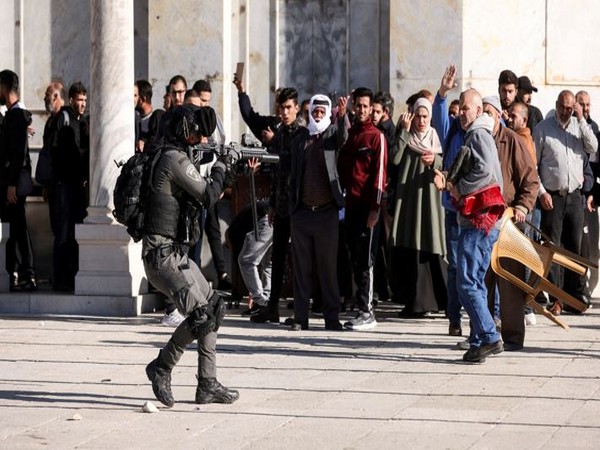

Last Friday’s clashes between Palestinian demonstrators and the Israeli Police in Al-Aqsa mosque in the old city of Jerusalem were an accident (or rather an explosion) waiting to happen, following three weeks of serious violence in Israel and the West Bank, in the wake of the terrorist killing of 14 Israelis in four different attacks and the fact that, Ramadan, Passover, and Easter, three major holidays of Islam, Judaism and Christianity are occurring at the same time this year.
More than 150 Palestinians were wounded by Israeli riot police on 15 March at the compound of the Al Aqsa Mosque, which is the third holiest site in Islam and is revered by Jews as the Temple Mount, when hundreds of Palestinians hurled stones and firecrackers at the nearby Jewish prayer area of the Western Wall. Police arrested 470 persons, the majority of which were released over the weekend.
According to the Red Crescent, 152 Palestinians were struck by sponge-tipped bullets and suffered tear-gas inhalation. Two are in serious condition.
The incident was repeated on a smaller scale on Sunday when Palestinians, trying to block visitors from entering the Temple Mount, threw stones on buses carrying Jewish worshippers in an effort to block them from entering the compound.
According to a police statement, “hundreds of youths, some masked, began collecting and stockpiling stones in the Mount’s passageways in an effort to create disorder and block visitor pathways by means of stones and other improvised barriers.”
In a joint statement, the Palestinian Authority and Jordan, which has custodianship over the holy site said that Israel was responsible for “a dangerous and condemnable escalation that threatens to explode the situation.”
UN Secretary-General Antonio Guterres on Saturday urged all leaders on all sides “to help calm the situation, end provocations and uphold the status quo of the holy sites in Jerusalem.”
In a statement, US State Department spokesman Ned Price said: “We call on all sides to exercise restraint and avoid provocative actions and rhetoric.” The Foreign Ministers of France, Spain and Italy also called the two sides to refrain from engaging in violence.
It was expected that there would be clashes as some far-right Jewish groups announced that they would storm the Al-Aqsa Mosque during the Passover and offer animal sacrifices in the compound’s courtyards, something that would certainly enrage Palestinian worshippers who gather there for Friday’s prayers.
On Saturday the Izzat al-Rishq, the leader of the Hamas Islamic Resistance Movement that governs the Gaza Strip, said that Hamas had sent messages to mediators that “Hamas does not seek a new war in Gaza but Jerusalem and Al-Aqsa Mosque are a red line and that any provocation will be met with confrontation.”
It should be noted that the holy site, which is sacred to Jews and Muslims, has often been the epicenter of Israeli-Palestinian strife, and that clashes at Al-Aqsa last year sparked an 11-day war with Hamas militants in the Gaza Strip. The escalation of tension in Jerusalem triggered the worst round of violence in years in the Gaza Strip, leaving more than 260 Palestinians and 13 Israelis dead.
In the past two weeks, twenty Palestinians were killed by the Israeli security forces. According to the Israeli government, most of them were armed individuals who perpetrated terrorist attacks or were involved in exchanges of gunfire with the Israel Defense Forces (IDF). According to press reports, at least 25 Palestinians have been killed so far, including an unarmed woman and a lawyer who was a bystander.
It should be noted that the Israeli far-right has been consistently fanning the flames of confrontation with the Arabs, as in the past month Jewish extremists were involved in revenge attacks in 60 incidents of stone-throwing and destruction of Palestinian property in many areas of the West Bank.
The Israeli far-right was incensed over the vandalism by Palestinians of Joseph’s Tomb in Nablus on the West Bank, which is a holy site for Jews. On 9 April, Palestinian rioters, after clashes with the IDF, set fire to the site, which caused damage to the gravestone of Joseph’s Tomb. The site had been vandalized by Palestinian rioters in 2015 and 2022.
Israeli Defense Minister Benny Ganz described the destruction caused to Joseph’s Tomb as “extremely serious” and added that he sent a “sharp message” to the Palestinian Authority about it.
The immediate reaction of the Palestinian President Mahmoud Abbas was to reprimand the security units in Nablus and to order the restoration of the site.
Although the coalition government currently ruling Israel does not want to follow the heavy-handed way Palestinians were treated by the former right-wing government of Benjamin Netanyahu, and Defense Minister Benny Ganz has given instructions to security forces and avoid arbitrary arrests and unnecessary military operations, there is a real danger that extremists from both sides may embark on new serious revenge attacks. The situation can then escalate into a military confrontation with Hamas, with hundreds of victims and widespread destruction.
On the one hand, the Israeli Army must show to the Israeli public that it acts decisively to combat violence and on the other avoid taking harsh measures that could lead to an explosion of violence and the outbreak of a new intifada (uprising).
As Israeli journalist Amos Harel points out, the Israeli army is ensuring that “its moves resonate publicly, with the aim of persuading the Israeli public that it’s acting with determination. But the sheer presence of soldiers in the villages and the refugee camps stimulate friction by itself and leads to Palestinian casualties, which in turn heightens the desire for revenge and prolongs the wave of violence.”